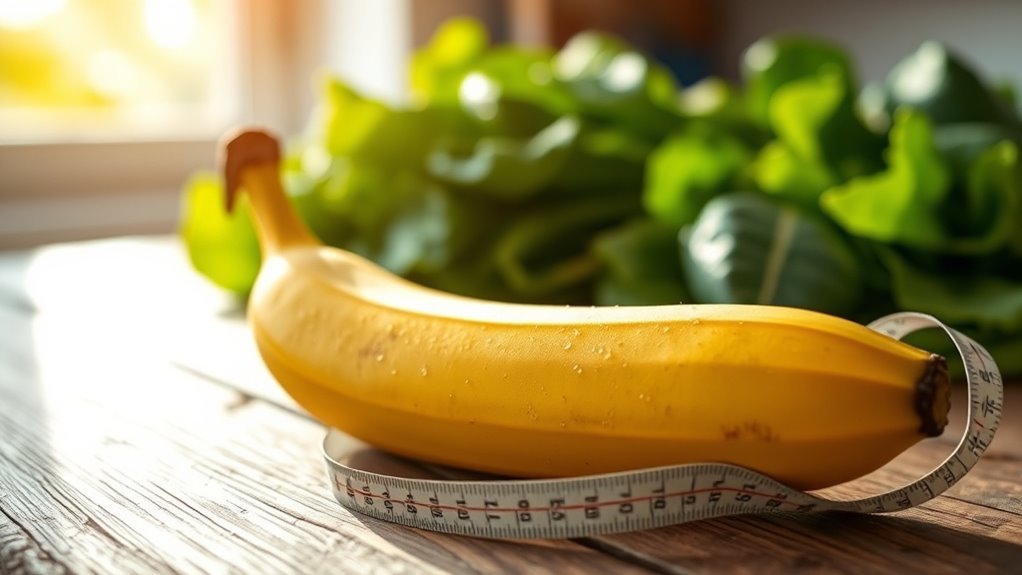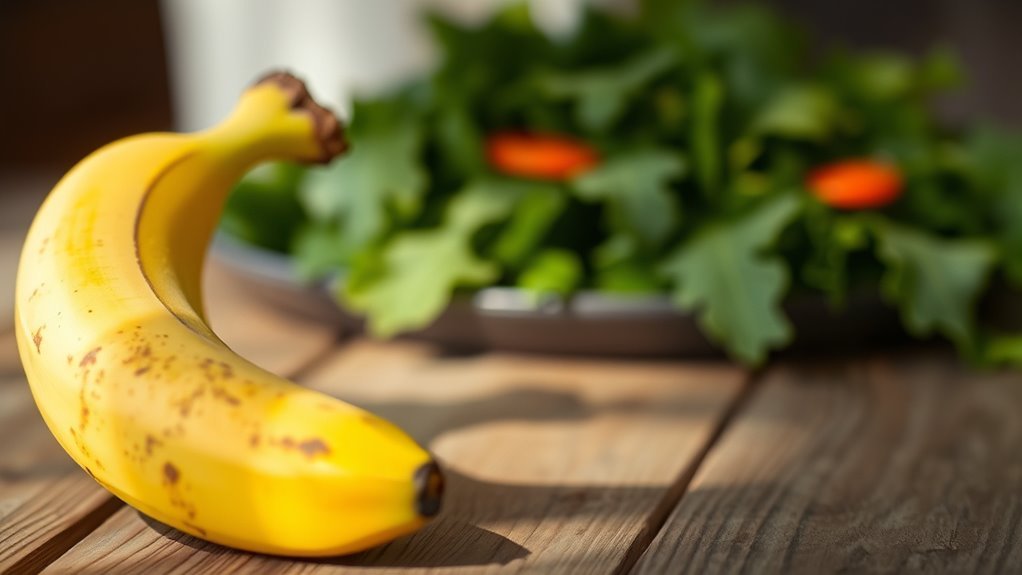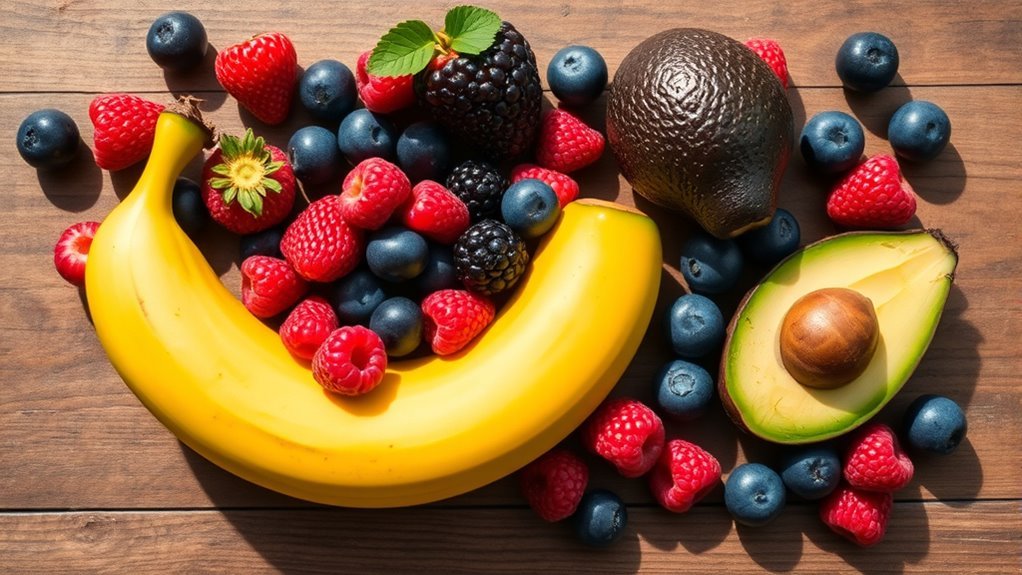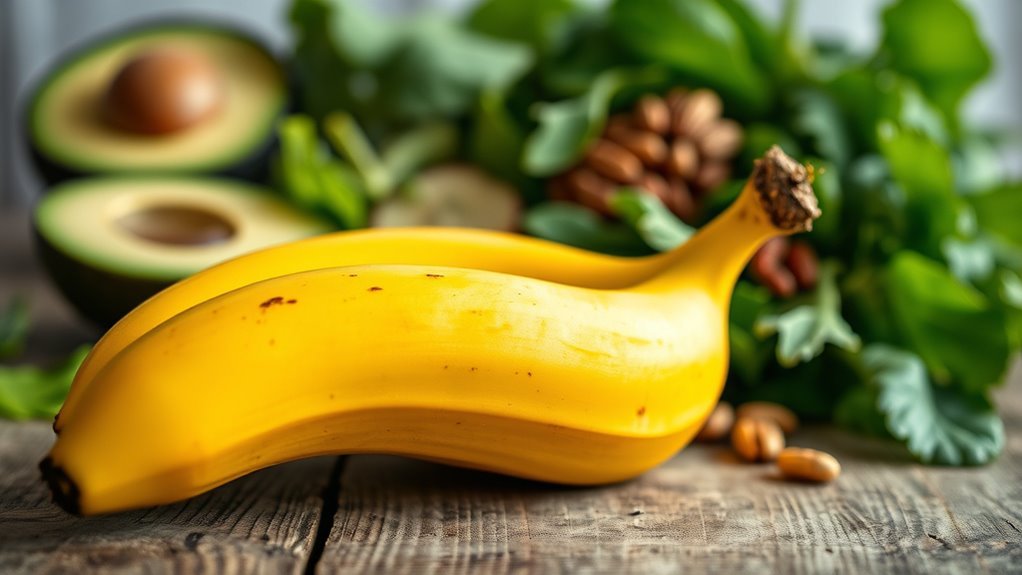You shouldn’t eat bananas on a keto diet because they contain around 27 grams of carbs per medium fruit, which can kick you out of ketosis. Comparatively, other fruits like strawberries and avocados have much lower carb content, making them better choices for keto. While bananas do offer potassium and other nutrients, you can find alternatives that align better with your dietary goals. If you need tips on how to satisfy your sweet tooth on keto, keep exploring.
Understanding the Keto Diet and Its Guidelines

Although many diets exist, the ketogenic (keto) diet stands out due to its unique approach to macronutrient distribution. At its core, the keto principles emphasize a high-fat, moderate-protein, and very low-carbohydrate intake. This shift trains your body to enter a state of ketosis, where it burns fat for energy instead of carbohydrates. There are various diet variations within the keto framework, such as targeted and cyclical keto, allowing you flexibility in your nutritional strategy. Understanding these guidelines is essential for achieving your health goals while embracing a lifestyle that promotes freedom of choice. By adhering to these principles, you can enjoy the benefits of sustained energy and weight management without feeling restricted.
Nutritional Profile of Bananas

When considering bananas in the context of a keto diet, it’s essential to examine their carbohydrate content, which is remarkably high compared to other fruits. A medium banana contains around 27 grams of carbs, primarily in the form of sugars. Additionally, understanding the vitamins and minerals in bananas, such as potassium and vitamin C, can help you assess their overall nutritional value.
Carbohydrate Content Overview
Understanding the carbohydrate content of bananas is vital for anyone considering a keto diet, as this fruit is often viewed as a staple in many diets. Bananas are primarily composed of carbohydrates, making them a less ideal choice for those aiming to limit their intake.
| Nutrient | Amount per 100g | Notes |
|---|---|---|
| Total Carbohydrates | 22.84g | Main carbohydrate source |
| Dietary Fiber | 2.6g | Contributes to digestive health |
| Net Carbohydrates | 20.24g | Total minus fiber content |
While bananas do provide some dietary fiber, their high net carbohydrate content means they can quickly exceed the daily limit on a keto diet. As a result, it’s important to weigh your options carefully.
Vitamins and Minerals Profile
While bananas may not fit neatly into a keto diet due to their high carbohydrate content, it’s worth noting their rich profile of vitamins and minerals. These delicious fruits are packed with essential banana nutrients, including vitamin C, vitamin B6, and potassium. Vitamin C supports immune function and skin health, while vitamin B6 plays an important role in brain development and function. Potassium is essential for maintaining healthy blood pressure and muscle function. Although you might need to limit your banana intake on keto, understanding these vitamin benefits can help you make informed dietary choices. If you’re looking for ways to incorporate other low-carb sources of these nutrients, consider leafy greens and avocados to maintain your nutrient balance.
Carb Content in Bananas vs. Other Fruits

Although bananas are often praised for their nutritional benefits, their carbohydrate content makes them a less-than-ideal choice for those following a keto diet. When you compare banana varieties to other fruits, the difference in carb content becomes clear.
Here’s a quick comparison:
| Fruit | Carbs (per 100g) | Keto-Friendly? |
|---|---|---|
| Bananas | 22g | No |
| Strawberries | 7.7g | Yes |
| Avocados | 9g | Yes |
As you can see, bananas rank high in carbs, making them a tough fit for a keto lifestyle. In contrast, fruits like strawberries and avocados offer lower carb options, allowing you more freedom in your diet while still enjoying delicious flavors.
The Role of Potassium in a Keto Diet
Bananas are known for their high potassium content, which is essential for various bodily functions, but their carb count makes them unsuitable for a keto diet. Maintaining adequate potassium levels is critical for electrolyte balance, especially when you’re limiting carbs. Here are some alternative potassium sources you can incorporate into your keto plan:
- Avocados
- Spinach
- Mushrooms
- Nuts and seeds
- Broccoli
These foods can help you reach your potassium needs without the excess carbs found in bananas. Proper potassium intake can support muscle function, fluid balance, and overall heart health, making it important for anyone following a keto lifestyle. Prioritizing these potassium-rich options will empower you to maintain your health while enjoying the freedom of your dietary choices.
Can Bananas Fit Into a Keto Meal Plan?
Can you really fit bananas into your keto meal plan? While bananas are often considered off-limits due to their higher carb content, it’s all about balance. If you’re careful with your portions, you might be able to include small amounts of banana in your diet. For instance, using mashed bananas in banana recipes can add flavor and moisture without overloading on carbs. Consider creating keto snacks like banana nut muffins, where you can use almond flour to keep the carb count low. Remember, moderation is key. If you can keep your daily net carbs within your target range, a small banana might just find its way into your keto lifestyle—allowing you to enjoy the taste and benefits without compromising your goals.
Alternatives to Bananas on a Keto Diet
When you’re following a keto diet, finding suitable alternatives to bananas can help you maintain your carb limits while still enjoying delicious flavors. Here are some keto-friendly fruits and low-carb snacks that can satisfy your cravings:
- Avocado: Rich in healthy fats and fiber, it’s perfect for a creamy texture.
- Berries: Options like raspberries and blackberries are lower in carbs than bananas and packed with antioxidants.
- Coconut: Fresh coconut meat or unsweetened coconut flakes can add a tropical twist.
- Olives: They’re a savory option, high in healthy fats and low in carbs.
- Zucchini: You can spiralize it for a revitalizing, low-carb snack.
These alternatives will keep your meals flavorful while staying aligned with your keto goals.
Health Benefits of Moderate Banana Consumption
Although many people associate bananas with high carbohydrate content, moderate consumption can actually offer several health benefits. For one, bananas are rich in potassium, which plays an important role in maintaining heart health and regulating blood pressure. They also contain dietary fiber, promoting digestive health and contributing to a feeling of fullness. Additionally, bananas provide essential vitamins like B6 and C, supporting overall immune function and energy metabolism. Research suggests that moderate consumption can help enhance mood due to the presence of tryptophan, a precursor to serotonin. By including bananas in your diet mindfully, you can enjoy these benefits without compromising your health goals, making them a valuable addition for those seeking balance and freedom in their nutrition.
Tips for Satisfying Your Sweet Tooth on Keto
To satisfy your sweet tooth on a keto diet, it’s essential to explore alternatives that align with low carbohydrate principles. This doesn’t mean you have to give up sweets altogether! Consider these tips to indulge responsibly:
Explore keto-friendly sweet alternatives to satisfy your cravings without compromising your low-carb lifestyle!
- Use sugar substitutes like erythritol or stevia for baking.
- Try making keto desserts, such as almond flour brownies or coconut flour cookies.
- Incorporate dark chocolate (85% cocoa or higher) for a rich flavor.
- Experiment with sugar-free gelatin or chia seed puddings for a revitalizing treat.
- Blend avocado with cocoa powder and sweetener for a creamy mousse.
Frequently Asked Questions
1. Can you eat bananas on a keto diet?
While bananas are a healthy fruit, they are relatively high in carbohydrates, which makes them less suitable for a keto diet. A medium banana contains around 27 grams of carbs, which can take up a significant portion of your daily carb allowance on a ketogenic diet that typically limits intake to about 20-50 grams per day. Therefore, it’s advisable to limit or avoid bananas if you’re strictly following a keto regimen.
2. What fruits can I eat on a keto diet?
On a keto diet, it’s best to choose low-carb fruits. Some great options include berries like strawberries, raspberries, and blackberries, as well as avocados and tomatoes. These fruits are lower in carbohydrates compared to bananas and can be enjoyed in moderation as part of your keto meal plan.
3. How many carbs are in a banana?
A medium-sized banana contains approximately 27 grams of carbohydrates. This includes about 3 grams of fiber and 14 grams of sugar. When considering a ketogenic diet, the net carbs (total carbs minus fiber) would be around 24 grams, which is quite high for someone aiming to keep their daily carb intake low.
4. What are the health benefits of bananas?
Bananas are rich in several essential nutrients, including potassium, vitamin C, vitamin B6, and dietary fiber. They are known to support heart health, aid digestion, and provide quick energy due to their natural sugars. However, for those on a keto diet, it’s essential to weigh these benefits against the high carbohydrate content.
5. Can I have banana-flavored products on a keto diet?
While banana-flavored products may be lower in carbs compared to whole bananas, it’s crucial to check the nutritional labels. Many banana-flavored items contain added sugars and high-carb ingredients that could disrupt your keto diet. If you want to enjoy banana flavoring, consider using natural extracts or very small amounts in moderation, but always keep track of your overall carb intake.
References
- https://www.healthline.com/nutrition/bananas-on-keto
- https://www.medicalnewstoday.com/articles/323156
- https://www.dietdoctor.com/low-carb/keto/faq
- https://www.ncbi.nlm.nih.gov/pmc/articles/PMC7021577/
- https://www.webmd.com/diet/obesity/guide/keto-diet
- https://www.reuters.com/article/us-health-keto-idUSKBN1W32FN
- https://www.mayoclinic.org/healthy-lifestyle/nutrition-and-healthy-eating/expert-answers/keto-diet/faq-20464832
- https://www.clevelandclinic.org/health/diet-nutrition/what-is-the-keto-diet
- https://www.nutrition.gov/topics/nutrition-education/keto-diet


